Build Intelligent Applications That Transform Your Business
We help enterprises and startups design, develop, and deploy AI-powered applications using modern LLMs, machine learning models, automation pipelines, and secure cloud infrastructure. From strategy and model development to AI integration services and MLOps, we deliver production-ready AI applications that drive measurable business outcomes.

Partnering with ValueCoders was one of the best decisions for my business. Their AI experts quickly understood our goals and delivered a solution that cut manual work by 40%.
- Larry
We offer end-to-end AI development services that help you automate workflows, build intelligent products, and enable data-driven decision-making.
We offer AI consulting services to help businesses develop AI strategies and implement AI solutions tailored to their needs.
We help optimize pre-trained AI models by fine-tuning them on specific datasets, making them more accurate and effective.
We help you implement advanced chatbots, AI-powered conversational tools, and smart AI Assistants to enhance customer experience.
We design, build, and deploy AI models from the initial concept to the final implementation, providing a fully integrated AI solution.
We design and build unique AI applications that cater to the specific requirements and challenges of individual businesses.
We help connect AI models with your apps and improve performance post-deployment, ensuring efficient and effective integration of AI technology.
Our intelligent AI agents are designed to automate tasks, enhance user interactions, and drive real-time decision-making.
We offer scalable enterprise AI development services to help automate operations, make data-driven decisions, and unlock new efficiencies.
We build generative AI systems for content, code, image, or chatbot use cases using LLMs and diffusion models.
We prepare and manage your data pipelines and architecture to support advanced AI applications.
From ideation to deployment, we handle it all, trusted by 2500+ clients across 20+ years.

AI development requires more than building a model – you need a partner who understands architecture, data, cloud operations, compliance, and long-term product evolution.
ValueCoders brings deep industry experience, global delivery capabilities, and enterprise-grade engineering discipline to help your AI initiatives succeed.
From virtual agents to advanced analytics, we help you get AI-tailored solutions for your business case.
Partnering with businesses in diverse sectors to unlock new avenues for growth and innovation.
We take pride in our cutting-edge technology stack. This carefully curated collection of technologies forms the foundation of our AI solutions, enabling us to deliver exceptional results to our clients.
A structured, six-step process ensures predictable delivery, high accuracy, scalable infrastructure, and long-term AI readiness for your organization.
AI Discovery & Use-Case Definition
We analyze business challenges, data availability, workflows, and success metrics to identify high-impact AI opportunities.
Data Preparation & Pipeline Setup
We clean, annotate, validate, and structure your data while building secure, automated pipelines for ML operations.
Model Development & Fine-Tuning
We develop or fine-tune ML/LLM models optimized for accuracy, latency, fairness, and real-world performance.
AI Application Development & Integration
We integrate the model into your product or systems through APIs, microservices, plugins, or custom workflows.
Deployment, MLOps & Monitoring
We deploy your AI system using cloud-native MLOps practices, set up monitoring dashboards, and detect drift or performance gaps.
Continuous Improvement & Scaling
We retrain models, optimize inference cost, implement feedback loops, and enhance features to evolve your AI capabilities.
Choose from our flexible hiring models designed to fit your needs and budget.
For businesses with well-defined project scope and requirements.
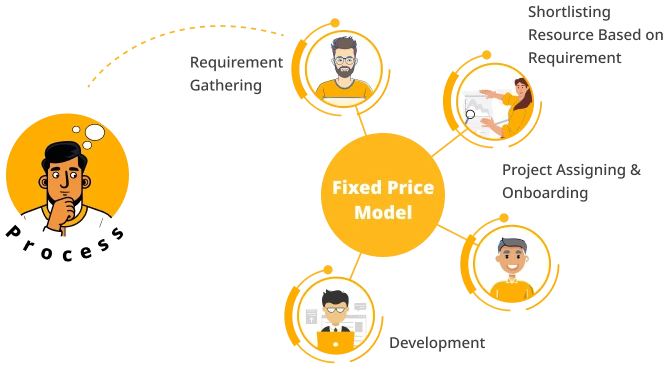
For businesses with long-term project requirements or complex development process. They get more control of the process.
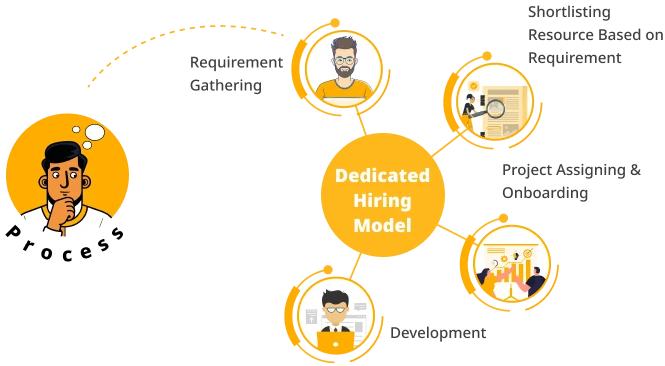
For businesses looking to pay for completed project instead of committing to fixed project cost.
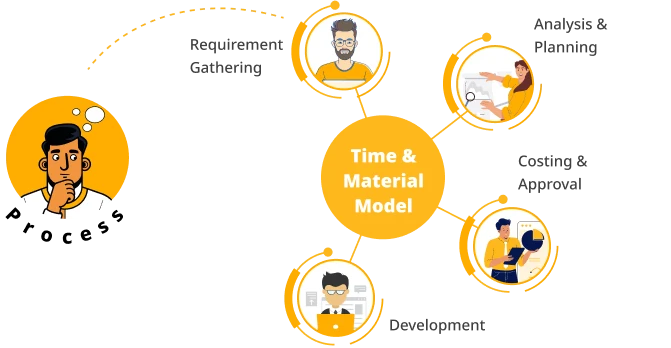
Let’s explore the full journey of building AI solutions, from strategy & model training to deployment and real-world applications across different industries.
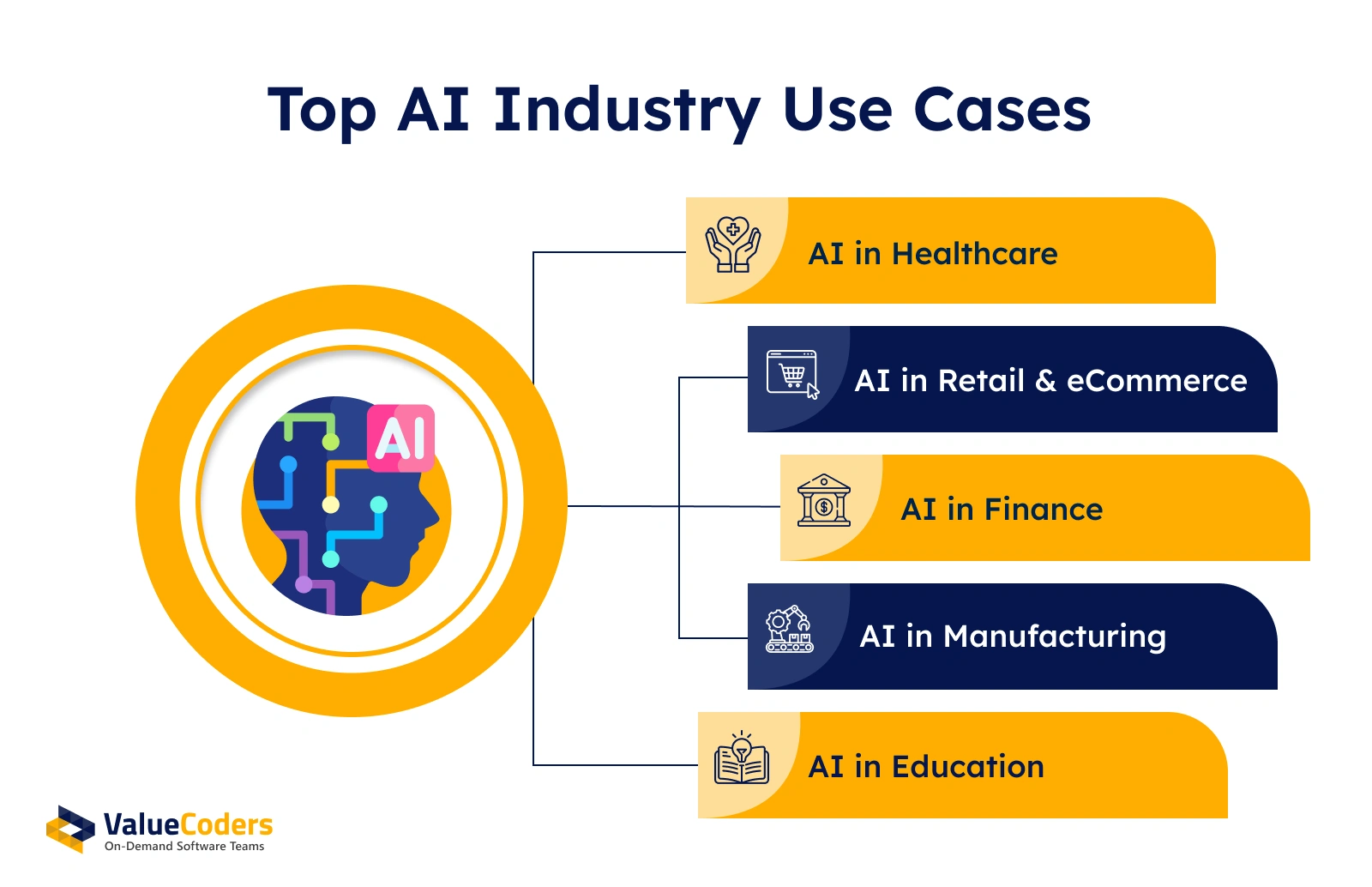
Artificial Intelligence is being used in many industries to solve real problems. It helps businesses work faster, avoid mistakes, and make better decisions.
Here are some examples of how different industries use AI today.
AI-driven healthcare systems can improve accuracy, speed, and efficiency in diagnostics and treatment. Common use case include:
Retail stores and online shopping sites use AI to give better service to buyers. AI use-cases in retail:
AI is increasingly used in finance for fraud detection, identifying anomalies in financial transactions, and risk assessment. Popular uses in finance include:
Factories use AI to keep machines working well and reduce delays. AI use in manufacturing:
Schools and learning apps use AI to help students learn better. Teachers also get help with marking and tracking performance. In education, AI is used for:
Most companies struggle with whether to build a custom AI system or buy an existing solution. The right choice depends on control, cost, compliance, and long-term value.
1. When Buying AI Makes Sense
Ready-made AI tools are ideal when your requirements are standard, such as OCR, transcription, sentiment analysis, or keyword extraction.
Buying is ideal if you need:
2. When Custom AI Is the Better Investment
Build custom AI when you need:
3. Hidden Costs of Buying Off-the-Shelf
4. Long-Term ROI With Custom AI
Custom AI gives you:
Conclusion:
Buying is great for speed. Building is essential for differentiation, long-term ROI, and enterprise security.
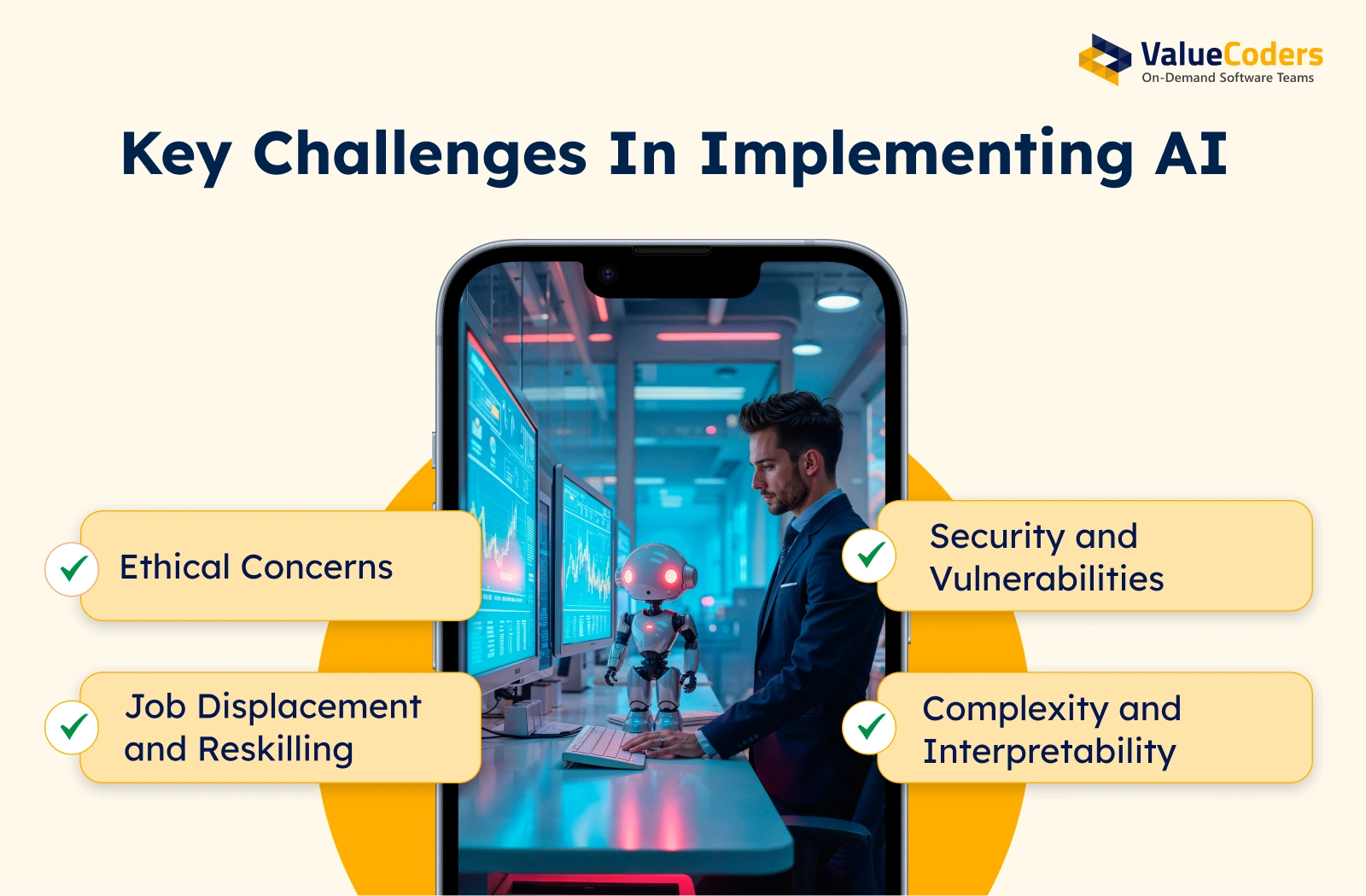
While AI offers transformative potential across industries, its integration into real-world operations is not without significant challenges.
Understanding these challenges is crucial for developing responsible, effective, and sustainable AI strategies.
Ethical Concerns
AI systems are vulnerable to biases present in the data used for training. This can lead to unfair and discriminatory outcomes, affecting certain demographic groups more than others. Addressing these biases and ensuring fairness is a significant ethical challenge in AI development.
Security and Vulnerabilities
AI systems may be vulnerable to attacks, such as adversarial attacks on computer vision systems or data poisoning attacks on machine learning models. Ensuring the security of AI systems and protecting against potential vulnerabilities is crucial.
Job Displacement and Reskilling
The widespread adoption of AI has raised concerns about job displacement, as some tasks previously performed by humans may become automated. Preparing the workforce for the AI era through upskilling and reskilling is essential to mitigate these concerns.
Complexity and Interpretability
Deep learning models, in particular, are complex and often regarded as black boxes, making it challenging to interpret their decisions. Developing explainable AI techniques is vital to understand how AI systems arrive at their conclusions and ensure transparency in critical applications.
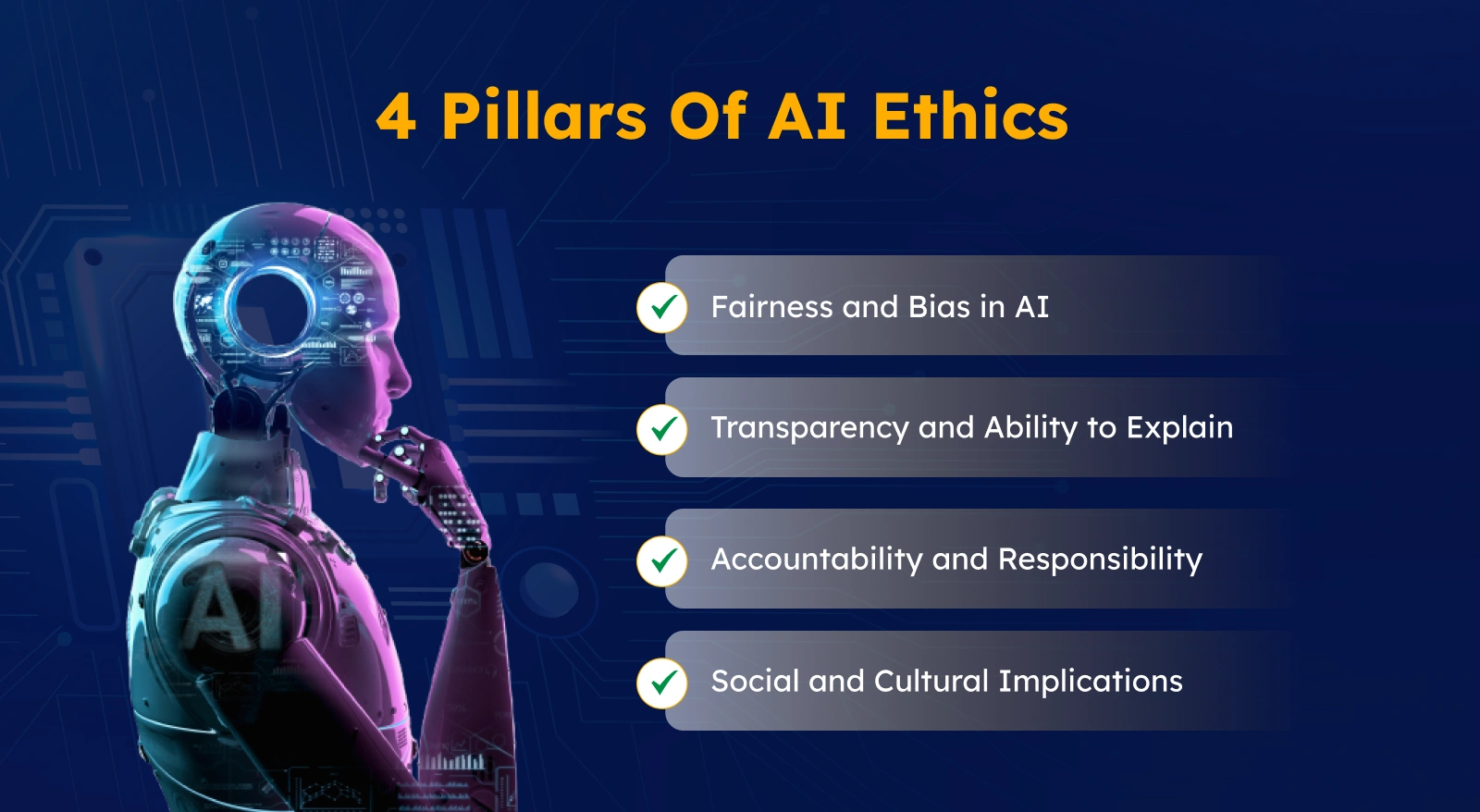
As artificial intelligence becomes increasingly embedded in decision-making processes, the importance of ethical considerations has grown significantly. Let’s learn how to address these AI ethics:
Fairness and Bias in AI
To address bias, developers must carefully curate training data and employ techniques that ensure balanced representation of different groups. Fairness-aware algorithms and audit mechanisms help mitigate bias in AI systems.
Transparency and Ability to Explain
AI models must be interpretable and explainable to build trust with users. Techniques like LIME (Local Interpretable Model-agnostic Explanations) and SHAP (Shapley Additive ExPlanations) provide insights into model decisions.
Accountability and Responsibility
AI developers and organizations must take responsibility for the consequences of their AI systems. Establishing AI ethics committees and adhering to ethical frameworks ensures accountability and ethical AI development.
Social and Cultural Implications
Developers need to consider the social impact of AI systems and involve diverse stakeholders in the development process. Ensuring AI applications are inclusive and beneficial to society is a crucial ethical consideration.
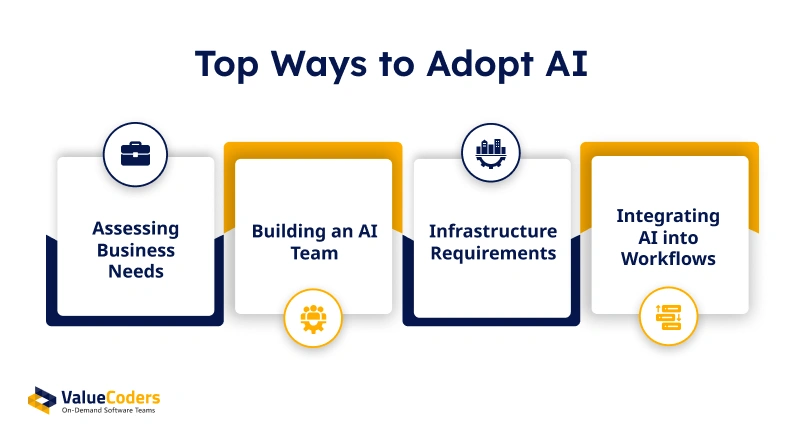
Successfully integrating AI into an organization requires a strategic approach tailored to specific goals, resources, and challenges.
The following strategies help organizations maximize the value of AI while minimizing risks and resistance.
Assessing Business Needs
Identifying areas where AI can provide the most value is the first step in AI adoption. Organizations should evaluate their existing processes and challenges to determine where AI can make a significant impact.
Building an AI Team
Developing AI capabilities requires skilled professionals, including data scientists, machine learning engineers, and domain experts. Organizations can build an in-house AI team or collaborate with AI development partners.
Infrastructure Requirements
AI development often requires significant computational resources, especially for deep learning models. Organizations must consider the infrastructure needed for AI training, such as GPUs or TPUs, and decide between cloud-based or on-premises solutions based on their specific requirements and budget.
Integrating AI into Workflows
Integrating AI systems into existing workflows can be a complex process. Organizations should plan for change management and properly train employees to ensure a smooth transition. Addressing any resistance to AI adoption among employees is essential for successful integration.
AI projects succeed when they deliver measurable business impact – not just technical achievements. Understanding ROI helps you justify investment, prioritize projects, and scale the right initiatives.
1. Define Clear Success Metrics Early
Metrics vary by use-case. Examples include:
2. Quantify Automation Impact
3. Track Revenue-Influencing Metrics
For customer-facing systems like recommendations or chatbots, track:
4. Measure Operational Efficiency
AI improves workflows across support, finance, HR, logistics, and IT.
Track:
5. Consider Long-Term Cost Reduction
6. Evaluate Model Performance vs. Business Outcomes
Conclusion:
When tracked correctly, AI delivers measurable ROI through cost reduction, increased speed, higher revenue, better decisions, and improved customer experience.
Planning to outsource AI development in India? Here are answers to the most common questions organizations ask before building an AI application – from data requirements to cost, timeline, and deployment considerations.
Ans. A leading AI app development company with expertise in AI solutions, ValueCoders offers industry-specific applications and a client-centric approach. We offer customized development, agile practices, data security, and cost-effective solutions with a proven delivery process.
Ans. Simple prototypes take 4-8 weeks; production applications typically take 3–6 months depending on complexity.
Ans. The cost of AI application development services can vary depending on the complexity of the project, the size of the dataset, infrastructure requirements, and the expertise of the development team. You can contact our experts and we will send you a quote within 24 hours.
Ans. Yes, AI models can be integrated into existing software systems through APIs or by embedding them into the application’s architecture.
Ans. A leading AI application development company, we employ techniques like data preprocessing, bias detection, and fairness-aware algorithms to minimize bias and ensure fairness in AI models.
Ans. Our AI application development company prioritizes data privacy and security by complying with relevant regulations, implementing encryption measures, and ensuring access controls to protect sensitive information.
Ans. We employ rigorous testing and validation procedures to ensure that AI models produce accurate and reliable results. Ongoing monitoring helps maintain model performance over time.
Ans. We regularly update AI models to adapt to changing data distributions and user requirements. Maintenance includes monitoring performance, bug fixes, and addressing potential issues.
Ans. Yes, we can integrate AI into your existing software or workflows including CRM, ERP, SaaS dashboards, web apps, mobile apps, and internal tools.
We are grateful for our clients’ trust in us, and we take great pride in delivering quality solutions that exceed their expectations. Here is what some of them have to say about us:

Co-founder, Miracle Choice

Executive Director

Director

Director
Trusted by Startups and Fortune 500 companies
We can handle projects of all complexities.
Startups to Fortune 500, we have worked with all.
Top 1% industry talent to ensure your digital success.



Let's discuss how we can bring your vision to life.